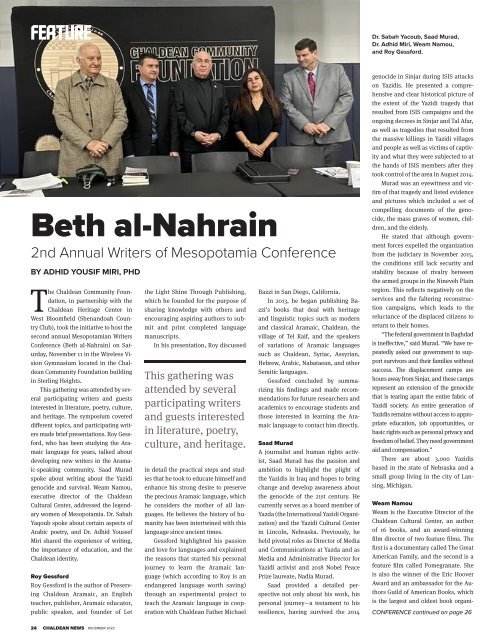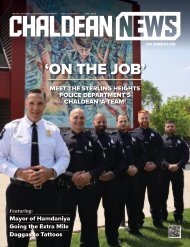You also want an ePaper? Increase the reach of your titles
YUMPU automatically turns print PDFs into web optimized ePapers that Google loves.
FEATURE<br />
Dr. Sabah Yacoub, Saad Murad,<br />
Dr. Adhid Miri, Weam Namou,<br />
and Roy Gessford.<br />
Beth al-Nahrain<br />
2nd Annual Writers of Mesopotamia Conference<br />
BY ADHID YOUSIF MIRI, PHD<br />
The Chaldean Community Foundation,<br />
in partnership with the<br />
Chaldean Heritage Center in<br />
West Bloomfield (Shenandoah Country<br />
Club), took the initiative to host the<br />
second annual Mesopotamian Writers<br />
Conference (Beth al-Nahrain) on Saturday,<br />
November 11 in the Wireless Vision<br />
Gymnasium located in the Chaldean<br />
Community Foundation building<br />
in Sterling Heights.<br />
This gathering was attended by several<br />
participating writers and guests<br />
interested in literature, poetry, culture,<br />
and heritage. The symposium covered<br />
different topics, and participating writers<br />
made brief presentations. Roy Gessford,<br />
who has been studying the Aramaic<br />
language for years, talked about<br />
developing new writers in the Aramaic-speaking<br />
community. Saad Murad<br />
spoke about writing about the Yazidi<br />
genocide and survival. Weam Namou,<br />
executive director of the Chaldean<br />
Cultural Center, addressed the legendary<br />
women of Mesopotamia. Dr. Sabah<br />
Yaqoub spoke about certain aspects of<br />
Arabic poetry, and Dr. Adhid Youssef<br />
Miri shared the experience of writing,<br />
the importance of education, and the<br />
Chaldean identity.<br />
Roy Gessford<br />
Roy Gessford is the author of Preserving<br />
Chaldean Aramaic, an English<br />
teacher, publisher, Aramaic educator,<br />
public speaker, and founder of Let<br />
the Light Shine Through Publishing,<br />
which he founded for the purpose of<br />
sharing knowledge with others and<br />
encouraging aspiring authors to submit<br />
and print completed language<br />
manuscripts.<br />
In his presentation, Roy discussed<br />
This gathering was<br />
attended by several<br />
participating writers<br />
and guests interested<br />
in literature, poetry,<br />
culture, and heritage.<br />
in detail the practical steps and studies<br />
that he took to educate himself and<br />
enhance his strong desire to preserve<br />
the precious Aramaic language, which<br />
he considers the mother of all languages.<br />
He believes the history of humanity<br />
has been intertwined with this<br />
language since ancient times.<br />
Gessford highlighted his passion<br />
and love for languages and explained<br />
the reasons that started his personal<br />
journey to learn the Aramaic language<br />
(which according to Roy is an<br />
endangered language worth saving)<br />
through an experimental project to<br />
teach the Aramaic language in cooperation<br />
with Chaldean Father Michael<br />
Bazzi in San Diego, California.<br />
In 2013, he began publishing Bazzi’s<br />
books that deal with heritage<br />
and linguistic topics such as modern<br />
and classical Aramaic, Chaldean, the<br />
village of Tel Kaif, and the speakers<br />
of variations of Aramaic languages<br />
such as Chaldean, Syriac, Assyrian,<br />
Hebrew, Arabic, Nabataean, and other<br />
Semitic languages.<br />
Gessford concluded by summarizing<br />
his findings and made recommendations<br />
for future researchers and<br />
academics to encourage students and<br />
those interested in learning the Aramaic<br />
language to contact him directly.<br />
Saad Murad<br />
A journalist and human rights activist,<br />
Saad Murad has the passion and<br />
ambition to highlight the plight of<br />
the Yazidis in Iraq and hopes to bring<br />
change and develop awareness about<br />
the genocide of the 21st century. He<br />
currently serves as a board member of<br />
Yazda (the International Yazidi Organization)<br />
and the Yazidi Cultural Center<br />
in Lincoln, Nebraska. Previously, he<br />
held pivotal roles as Director of Media<br />
and Communications at Yazda and as<br />
Media and Administrative Director for<br />
Yazidi activist and 2018 Nobel Peace<br />
Prize laureate, Nadia Murad.<br />
Saad provided a detailed perspective<br />
not only about his work, his<br />
personal journey—a testament to his<br />
resilience, having survived the 2014<br />
genocide in Sinjar during ISIS attacks<br />
on Yazidis. He presented a comprehensive<br />
and clear historical picture of<br />
the extent of the Yazidi tragedy that<br />
resulted from ISIS campaigns and the<br />
ongoing decrees in Sinjar and Tal Afar,<br />
as well as tragedies that resulted from<br />
the massive killings in Yazidi villages<br />
and people as well as victims of captivity<br />
and what they were subjected to at<br />
the hands of ISIS members after they<br />
took control of the area in August 2014.<br />
Murad was an eyewitness and victim<br />
of that tragedy and listed evidence<br />
and pictures which included a set of<br />
compelling documents of the genocide,<br />
the mass graves of women, children,<br />
and the elderly.<br />
He stated that although government<br />
forces expelled the organization<br />
from the judiciary in November 2015,<br />
the conditions still lack security and<br />
stability because of rivalry between<br />
the armed groups in the Nineveh Plain<br />
region. This reflects negatively on the<br />
services and the faltering reconstruction<br />
campaigns, which leads to the<br />
reluctance of the displaced citizens to<br />
return to their homes.<br />
“The federal government in Baghdad<br />
is ineffective,” said Murad. “We have repeatedly<br />
asked our government to support<br />
survivors and their families without<br />
success. The displacement camps are<br />
hours away from Sinjar, and these camps<br />
represent an extension of the genocide<br />
that is tearing apart the entire fabric of<br />
Yazidi society. An entire generation of<br />
Yazidis remains without access to appropriate<br />
education, job opportunities, or<br />
basic rights such as personal privacy and<br />
freedom of belief. They need government<br />
aid and compensation.”<br />
There are about 3,000 Yazidis<br />
based in the state of Nebraska and a<br />
small group living in the city of Lansing,<br />
Michigan.<br />
Weam Namou<br />
Weam is the Executive Director of the<br />
Chaldean Cultural Center, an author<br />
of 16 books, and an award-winning<br />
film director of two feature films. The<br />
first is a documentary called The Great<br />
American Family, and the second is a<br />
feature film called Pomegranate. She<br />
is also the winner of the Eric Hoover<br />
Award and an ambassador for the Authors<br />
Guild of American Books, which<br />
is the largest and oldest book organi-<br />
CONFERENCE continued on page 26<br />
24 CHALDEAN NEWS <strong>DECEMBER</strong> <strong>2023</strong>
















